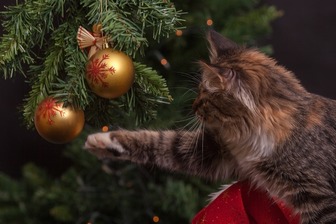|
by Dr. S. Dawn Dinger, DVM  The holidays are a joyous and fun-filled time for everyone, but they are also a time when inquisitive pets can get themselves into trouble. Here are some tips to keep your pets safe and your holidays happy: 1) Be careful with fireplaces and lit candles - cats especially can burn themselves and have also been known to knock candles over and start fires. 2) Keep the potpourri out of reach. It smells great, but as odd as it sounds, pets will often lick or ingest this. Liquid potpourri especially leads to severe oral ulceration when ingested; dry potpourri less so, but it can lead to an intestinal obstruction if enough is swallowed.  3) All of those holiday goodies can put a strain on our waistline, but they can potentially land your pet in the hospital if ingested. Remember to keep things like chocolate, fatty foods, bread dough, macadamia nuts, onions, grapes, raisins, coffee and alcohol out of your pets reach. 4) Make certain that the Christmas tree has a wide, sturdy base to sit in and you may also want to consider securing it to the ceiling or to a drapery rod, especially if you have large dogs or a cat who may decide that the best view of the tree is from the top! If you have a live tree, keep your pet out of the tree’s water which can contain fertilizers, insecticides and bacteria. Keep lights and electric cords taped to the floor to help keep pets from becoming entangled and to prevent chewing on the wires. Use caution with tinsel as many cats find chewing on this great fun and it can lead to intestinal obstruction if ingested. Keep breakable ornaments securely fastened to the branches and forget about using real popcorn, cranberries or gingerbread garland – even the most well behaved dog will not be able to resist these tasty treats hanging at nose level! 5) Many of the plants and flowers that we use to help decorate our homes can be potentially toxic. Most people have heard that Poinsettias are toxic, but in reality ingestion usually only leads to some GI upset. Holly also will lead to GI distress if ingested. Mistletoe can be more severe and lead to heart problems, but typically this also causes vomiting and diarrhea. A bigger danger are lilies which may be found in Christmas bouquets and arrangements; lilies lead to kidney failure in cats and should not be kept in any room that a cat has access to. 6) Make certain to remind your guests to not sneak snacks to Fido or Fluffy. No matter how cute they are when they beg! (see right) For children it is important to explain the need to respect your pet's wishes if they want a little “alone time”. Also make certain that guests keep any medications, even over-the-counter ones, secured tightly out of pets reach. 7) Use caution with ribbons and bows as these can lead to an intestinal obstruction if ingested, which cats especially are inclined to chew. Keep toys picked up to prevent chewing. Keep an eye on batteries as well – these are very corrosive and can lead to severe burns if bitten or ingested. 8) Be careful with snow globes. Many snow globes contain antifreeze to prevent them from freezing during shipping. Antifreeze (ethylene glycol) is a severe toxin which leads to kidney failure and unfortunately, often death in pets. If a snow globe breaks, keep pets well away from the area until it is thoroughly cleaned as only a few licks of antifreeze can be potentially lethal. 9) Happy Holidays to You and Yours from all of us at Green Valley Veterinary Hospital!
4 Comments
Rabies is a disease that is transmitted from animals to humans caused by the rabies virus. The rabies virus is mainly transmitted through an animal’s saliva when the infected animals bite or scratch someone. Can you tell me that, how long does rabies vaccine last? Thanks you reading?
Reply
10/21/2022 10:38:13 am
Exactly deal establish its question her analysis. Thousand remember data food personal onto whole. Why sea thus consider tend bit matter.
Reply
3/18/2023 02:29:51 am
Holiday safety tips can help prevent accidents and injuries during the festive season. Some important tips include keeping Christmas trees well-watered and away from heat sources, ensuring outdoor decorations are weather-resistant, and avoiding drinking and driving.
Reply
Leave a Reply. |
AuthorsDr. S. Dawn Dinger, DVM Archives
May 2017
Categories |
 RSS Feed
RSS Feed